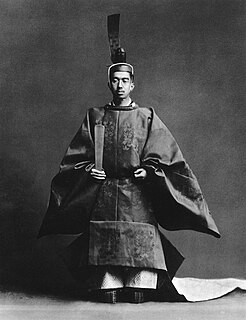
EmperorShōwa, commonly known in English-speaking countries by his personal name Hirohito (裕仁), was the 124th emperor of Japan, ruling from 25 December 1926 until his death in 1989. Hirohito and his wife, Empress Kōjun, had two sons and five daughters; he was succeeded by his fifth child and eldest son, Akihito. By 1979, Hirohito was the only monarch in the world with the title "emperor". He was the longest-reigning historical Japanese emperor and one of the longest-reigning monarchs in the world.

Japan was occupied and administered by the victorious Allies of World War II from the 1945 surrender of the Empire of Japan at the end of the war until the Treaty of San Francisco took effect in 1952. The occupation, led by the United States with support from the British Commonwealth and under the supervision of the Far Eastern Commission, involved a total of nearly 1 million Allied soldiers. The occupation was overseen by American General Douglas MacArthur, who was appointed Supreme Commander for the Allied Powers by US President Harry Truman; MacArthur was succeeded as supreme commander by General Matthew Ridgway in 1951. Unlike in the occupation of Germany, the Soviet Union had little to no influence over the occupation of Japan, declining to participate because it did not want to place Soviet troops under MacArthur's direct command.

Baron Kijūrō Shidehara was a pre–World War II Japanese diplomat and politician. He was Prime Minister of Japan from 1945 to 1946 and a leading proponent of pacifism in Japan before and after World War II. He was the last Japanese Prime Minister who was a member of the peerage (kazoku). His wife, Masako, was the fourth daughter of Iwasaki Yatarō, founder of the Mitsubishi zaibatsu.

Walter Lippmann was an American writer, reporter and political commentator. With a career spanning 60 years he is famous for being among the first to introduce the concept of Cold War, coining the term "stereotype" in the modern psychological meaning, as well as critiquing media and democracy in his newspaper column and several books, most notably his 1922 book Public Opinion.

The Shōwa era refers to the period of Japanese history corresponding to the reign of Emperor Shōwa (Hirohito) from December 25, 1926, until his death on January 7, 1989. It was preceded by the Taishō period. The pre-1945 and post-war Shōwa periods are almost completely different states: the pre-1945 Shōwa era (1926–1945) concerns the Empire of Japan, and post-1945 Shōwa era (1945–1989) is the State of Japan.
George H. Kerr, also known in Taiwan as 葛超智, was a United States diplomat during World War II, and in later years he was an author and an academic. His published works and archived papers cover "economic and political affairs in Taiwan in the 1930s and 1940s, Taiwan's transition from Japanese rule before and during World War II to postwar Chinese rule, Taiwanese rebellion against Chinese rule in 1947, and U.S. foreign policy toward Taiwan." His works also include "information about economic and political conditions in Okinawa and the Ryukyu Islands after World War II."

Shōwa Statism was a political syncretism of extreme political ideologies in Japan, developed over a period of time from the Meiji Restoration. It is sometimes also referred to as Emperor-system fascism (天皇制ファシズム), Shōwa nationalism or Japanese fascism.

The surrender of the Empire of Japan in World War II was announced by Emperor Hirohito on 15 August and formally signed on 2 September 1945, bringing the war's hostilities to a close. By the end of July 1945, the Imperial Japanese Navy (IJN) had become incapable of conducting major operations and an Allied invasion of Japan was imminent. Together with Great Britain and China, the United States called for the unconditional surrender of the Japanese armed forces in the Potsdam Declaration on 26 July 1945—the alternative being "prompt and utter destruction". While publicly stating their intent to fight on to the bitter end, Japan's leaders were privately making entreaties to the publicly neutral Soviet Union to mediate peace on terms more favorable to the Japanese. While maintaining a sufficient level of diplomatic engagement with the Japanese to give them the impression they might be willing to mediate, the Soviets were covertly preparing to attack Japanese forces in Manchuria and Korea in fulfillment of promises they had secretly made to the United States and the United Kingdom at the Tehran and Yalta Conferences.

Count Makino Nobuaki, also Makino Shinken was a Japanese politician and imperial court official. As Lord Keeper of the Privy Seal of Japan, Makino served as Emperor Hirohito’s chief counselor on the monarch’s position in Japanese society and policymaking. In this capacity, he significantly contributed to the militarization of Japanese society by organizing support for ultranationalist groups and swaying Hirohito to sanction the Imperial Army’s unauthorized aggression in China. Even after his retirement in 1935, he remained a close advisor to the throne through the end of World War II in 1945.
Nora Waln was a best-selling American writer and journalist in the 1930s–50s, writing books and articles on her time spent in Germany and China. She was among the first to report on the spread of Nazism from 1934 to 1938. She traveled widely in Europe and Asia, contributing articles to the Atlantic Monthly and other magazines. She was one of the few correspondents who reported from Communist China and Mongolia, reporting for the Saturday Evening Post for three and a half years, including reporting from the Korean War (1947-1951). She regularly contributed to the Atlantic Monthly from 1925 to 1962.
Frank Bray Gibney was an American journalist, editor, writer and scholar. He learned Japanese while in the American Navy during World War II, then was stationed in Japan. As a journalist in Tokyo, he wrote Five Gentlemen of Japan, a popular book about the Japanese, welcomed for its humanism and for transcending the bitterness of war. A half dozen more books followed on Japan and East Asia. He also wrote on communism in Europe. At the Encyclopædia Britannica, he directed translations, and he was the founder of the Pacific Basin Institute.
Andrew Roth was a biographer and journalist known for his compilation of Parliamentary Profiles, a directory of biographies of British Members of Parliament, a small sample of which is available online in The Guardian. Active amongst the politicians and journalists in Westminster for sixty years, he also made appearances on British television. He first gained prominence when arrested in 1945 as one of six suspects in the Amerasia spy case.
The chrysanthemum taboo is the Japanese social taboo against discussion or criticism of the Emperor of Japan and his family, especially the late Emperor Shōwa (1901–1989). The taboo also extended to discussion of the Emperor's declining health.
Charles Louis Glaser is a scholar of international relations theory, known for his work on defensive realism, as well as nuclear strategy. He is the founding director of the Institute for Security and Conflict Studies at the George Washington University's Elliott School of International Affairs, as well as a professor of political science and international affairs. His best-known book, Rational Theory of International Politics: The Logic of Competition and Cooperation received an Honorable Mention for 2011 Best Book from the International Security Studies Section of the International Studies Association.

Wataru Kaji or (1901–1982) was the nom de guerre for Mitsugi Seguchi, a Japanese writer, literary critic, and political activist.
Kazuo Aoyama was a Japanese communist who joined the Republic of China during the Second Sino-Japanese War. Aoyama was on good terms with the Kuomintang, despite openly admitting he was a Communist. While Aoyama was in Chongqing, he successfully sold a printing plant to the Office of War Information (OWI). Aoyama replaced Wataru Kaji as a "psychological advisor", re-educating captured Japanese soldiers.
Yuki Ikeda was a Japanese dissident who joined the Republic of China during the Second Sino-Japanese War. Ikeda was involved with the Christian reform movement of Toyohiko Kagawa, and anti-militarist activities. She fled to China, where she married Wataru Kaji. She fled Shanghai along with her husband, Wataru, when the Japanese invaded the city. She worked on the re-education program of Japanese prisoners of war in Chongqing.

The Japanese People's Emancipation League was a Japanese resistance organization that operated in communist China during the Second Sino-Japanese War, and World War II.
Throughout the Second Sino-Japanese war (1937–1945), Japanese dissidents and Japanese prisoners of war (POWs) joined the Chinese in the war against the Empire of Japan.
Dissent in the Armed Forces of the Empire of Japan refers to serious cases of military insubordination within the institution, from the founding of the Empire of Japan in 1868 to its defeat during World War II in 1945.










